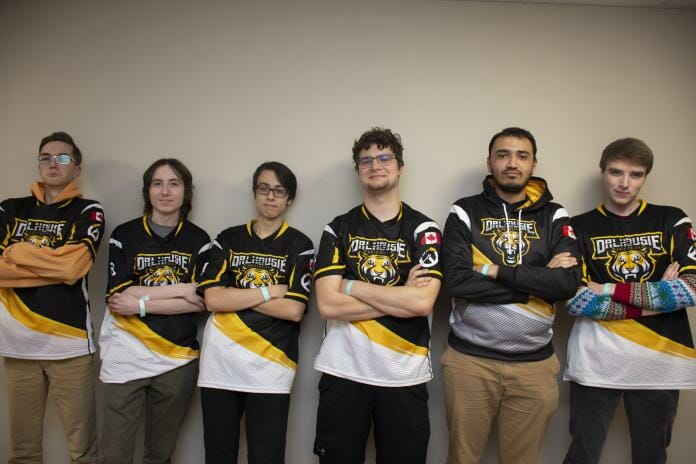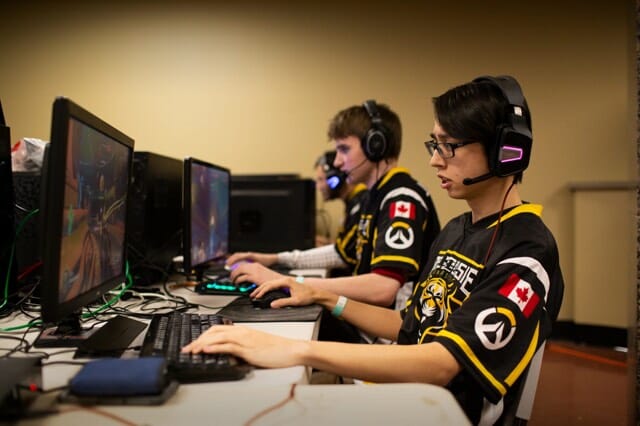
Watch out for Dalhousie’s Overwatch team
Inside the growing world of e-sports
Like any other sport, members of the Dalhousie University Overwatch team train for hours a week and travel for high-level competitions. But instead of stepping onto a field or court, their battle takes place on a computer screen. Now, they’re trying to get recognized by Dal as an official sports team.

Overwatch is a first-person shooter video game that pits teams of six people against each other. Dal’s team is part of the Dalhousie Gaming and Esports Society, which is run through the Dalhousie Student Union (DSU).
“One of the biggest things that we would like to see from the university is some type of fiscal support because the DSU hasn’t really been doing anything to help us,” says Overwatch team coach and Dalhousie Esports Society President Sahib Dhillon.
The cost of competition
In September of last year, the team travelled to compete in DreamHack Montreal, one of the biggest e-sports tournaments in Canada. It takes place at Montreal’s Olympic Stadium.
Dalhousie’s Overwatch team finished in fifth place out of 22 teams, but they narrowly missed out on the $6,000 USD prize pool that is split between the top three.
Team member David Fraser says that he’s travelled to Montreal twice for tournaments.
“Both times it cost me $600 out of pocket,” he says, between paying for flights, food, accommodations and tournament entry.

E-sports training
Four times a week, the Overwatch team will practice together for two hours, scrimmaging against other teams at a similar skill level. They’ll also spend between two and four hours reviewing game footage each week.
“We’ll go in with a specific purpose,” says Overwatch player Josh Neufeldt. “Like we’ll say, today we’re going to work on this one specific comp [a configuration of in game characters], and within this comp we’re going to work on how we rotate as a team, or how we use our abilities, or how we use ‘X’ player to fulfill ‘Y’ function.”
Because the Esports Society is not an official Dal sports team, they don’t have access to academic support or services that varsity athletes get. Dhillon hopes that could change. He says that workshops to help with time management, for example, would be beneficial for their team.
“Because of how much time you need to put into learning e-sports, it’s a huge time sink and it can really impact their [the players’] studies,” says Dhillon.
The economics of e-sports
E-sports is a growing global market. A February 2019 report by Newzoo, the leading provider of games and e-sports analytics, reported that revenues from e-sports would surpass $1 billion for the first time in 2019. It also projected that the market would reach $1.8 billion by the year 2022.
A lot of that money comes from brand investment. That includes all media rights, sponsorships or advertising revenues. In 2019, about $897.2 million, or 82 per cent, of the total market came from brand investments.
This is similar to revenue generated by traditional sports. For example, it includes the ability to sell streaming rights for e-sports teams, which is comparable to television broadcasting rights for sports. Companies can pay to sponsor e-sports teams who would then use that company’s equipment, just like in traditional sports. Instead of Adidas cleats or CCM skates, e-sports athletes use Turtle Beach headsets or an Alienware computer.
If Dalhousie decides to make the Overwatch team an official sports team of the university, they would become one of the first Canadian universities to expand into the growing e-sports market. Any brand investment revenue generated by the Overwatch team would go back to the university.
“You have a lot of potential for great leadership in the field, to showcase why this is going to be the next great thing,” says Neufeldt. “There’s a reason why so many companies are investing in this. It’s a billion-dollar industry.”






